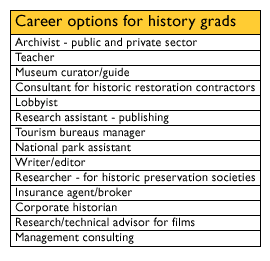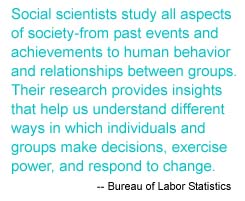|
'Working your degree'
|
 |
August 11, 2000: 8:24 a.m. ET
Insiders contest bad rap, tout the versatility of a history degree
By Staff Writer Shelly K. Schwartz
|
NEW YORK (CNNfn) - Brock Magoon was about to make a big mistake.
The third-year history major at Longwood College had planned to turn his passion for the past into a full-time job teaching high school students. But as he plodded his way through a series of upper level education courses, disillusion turned to distaste.
"My initial goals were to teach history and then go back to get a master's degree, which would give me more leeway to write on the side and do my own research," Magoon said. "But as I sat in the education classes, it just seemed like nonsense. Me and a few buddies of mine looked at each other and said, 'What are we doing?' I just decided that wasn't the route for me."
It was too late to switch majors, without extending his stay. And so, he - like so many collegians before him - stayed the course and hoped for the best.
"It was very frightening," Magoon, now 25, recalls. "If you're earning any kind of liberal arts degree and you don't want to teach or go to law school, you find yourself swimming in a pretty big ocean."
It turns out, history grads float.
"You can do almost anything with a public history degree, from working in museums, to battlefield parks, to tourism development for communities," said Bill Harbour, chairman of the history department for Longwood College in Farmville, Va. "A lot of our students are making their mark as political lobbyists, too."
Magoon graduated in 1997 and landed a job with relative ease at Booz-Allen & Hamilton - a McLean, Va.-based consulting firm. He works as a pricing  analyst, helping to review contract proposals from the Department of Defense. He writes for a Civil War encyclopedia set on the side. analyst, helping to review contract proposals from the Department of Defense. He writes for a Civil War encyclopedia set on the side.
And as for his friends - the ones who strayed from the traditional teaching path along with Magoon - they now work in management for Budweiser and CarMax.
"I think employers like to see that ability to think outside the box, which is a buzz word in the corporate culture now," he said. "You are really able to take a different perspective and bring to the table a new viewpoint from say, a business major, who's just taken accounting classes."
Visit CNNfn's Career page regularly to read "Working your Degree," a new column that highlights job opportunities for a different college major each week. See the links at the bottom of this page for profiles on the computer science, physical therapy and teaching professions.
History buffs
For those not committed to a lifetime of teaching or law, majoring in history has long been likened to the kiss of death.
But Robert F. Pace, associate professor of history at McMurry University in Abilene, Texas, said that's just because the masses don't understand the possibilities.
"I have so many kids who come to me as freshman and say, 'I love history but my Mom and Dad said I have to major in something I can get a job in,'" Pace said. "I've been watching the numbers of students in my history classes  go down because so many students are vocation-driven coming in the door. The perception is that you shouldn't major in history unless you want to teach. But there are so many wonderful things you can do with history and the skills it teaches you." go down because so many students are vocation-driven coming in the door. The perception is that you shouldn't major in history unless you want to teach. But there are so many wonderful things you can do with history and the skills it teaches you."
For starters, he said, those who opt for a history degree have no trouble landing jobs in museums as curators and guides, with publishing houses as writers or editors and with restoration contractors, who rely on historians to ensure their projects appear authentic and conform to social trends of time gone by.
Pace said the construction contracting business pays extremely well.
"It blows me away," he said. "It's a really growing niche market and you can make very good money at it. One guys I know contracts to restore old houses and his business makes in excess of $1 million a year."
One other fast-growing opportunity for history grads is that of an archivist, which is basically just a professional who helps dig up, organize and document old records and articles for court houses, libraries, historic sites and other institutions. Pace said many of the nation's more established companies, including big-name insurance firms, also actively seek out historians to help document and publicize their past.
And, of course, the tourism industry employs history grads for managerial posts at national parks and historic sites.
"The brilliance of history in my mind is that you are constantly using analysis to study situations and motives," Pace said. "What these students bring to the table are communication skills and the ability to analyze. What company or organization wouldn't want that?"
Students interested in history but anxious to avoid teaching commonly focus their studies on "public history" - a major that has been around for ages but has only gained attention in the last 20 years.
Such a degree positions history grads to pursue a multitude of corporate positions - from marketing to research to consulting. As a result, the jobs most history majors land are generally unrelated to their academic discipline, the Bureau of Labor Statistics reports.
Pace said roughly half of his students these days go on to teach, while most of the others end up in business. That jives with data collected by "The College Majors Handbook," published by JIST Works, Inc., which found "the overwhelming majority of history majors are employed in jobs that are not closely related to their undergraduate field of study."
Some 13 percent of those with a bachelor's degree in history work in managerial or administrative jobs, it found, while another 16 percent work in various sales, marketing, insurance, securities and real estate sales occupations.
(Click here for last week's "Working Your Degree" column on teaching.)
Top notch communication skills, both written and oral, are essential for all
professions that history majors enter.
Looking ahead
According to the Bureau of Labor Statistics, job opportunities for social scientists - the category into which history grads fall - are expected to be best in social service agencies, research and testing services, and management consulting firms.
The government defines this group as professionals who study all aspects of society—from past events and achievements to human behavior and relationships between groups. 
"Their research provides insights that help us understand different ways in which individuals and groups make decisions, exercise power, and respond to change," the BLS reported in its latest Occupational Outlook survey. "Through their studies and analyses, social scientists suggest solutions to social, business, personal, governmental, and environmental problems."
Those in the industry held about 50,000 jobs in 1998, the most recent year for which data are available.
As one would expect, the Bureau reports that a doctorate degree, or Ph.D., is required for most positions on the collegiate level and is pivotal for advancement to many top nonacademic research and administrative posts. Students with a master's degree in social science qualify for teaching jobs in junior colleges.
The Bureau notes that students who earn only a bachelor's degree have "limited opportunities and in most social science occupations do not qualify for 'professional' positions." But it goes on to say that such a degree does "provide a suitable background for many different kinds of entry-level jobs, such as research assistant, administrative aide, or management or sales trainee."
History majors also can land teaching positions in secondary and elementary schools.
Overall employment of social scientists is expected to grow between 10 and 20 percent through 2008, about as fast as the average for all occupations, the Bureau projects. Prospects are best, it notes, for those with advanced degrees, and usually are better in disciplines such as sociology and geography, which offer more opportunities in nonacademic settings.
Earnings potential
Salary levels for history grads vary dramatically, depending on the employer and job title. Those who work in the public sector and for nonprofit historical societies, for example, earn less than their peers who accept corporate positions.
And according to "The College Majors Handbook," history majors who run their own companies - consulting or otherwise - have the highest earnings of all grads from this field of study. Likewise, those who work in jobs that are closely related to their major earn substantially less than their counterparts who flew the coop.
The BLS reports median annual earnings for social scientists (excluding economists, psychologists, and urban and regional planners) were about $39,000 in 1998, the most recent year for which data are available.
The lowest 10 percent earned less than $21,530 and the highest 10 percent earned more than $80,640 a year.
More specifically, "The College Majors Handbook" found that salaries for history majors average $45,900 per year, better than the average for all social scientists but still about 5 percent below the average for all workers with a bachelor's degree.
History majors who work for private, for-profit firms, the handbook shows, earned nearly $50,000, while self-employed history majors with their own businesses earn an average of $65,200 annually.
You may not get rich, but advocates of history degrees say you won't be hard up for work either.
"The people skills you learn as a history major will serve you well whether you go into teaching, law, communications or anything else," Pace said. "More and more history majors are starting to see that." 
-- Click here to send e-mail to Shelly K. Schwartz
|
|
|
|
|
 |

|

